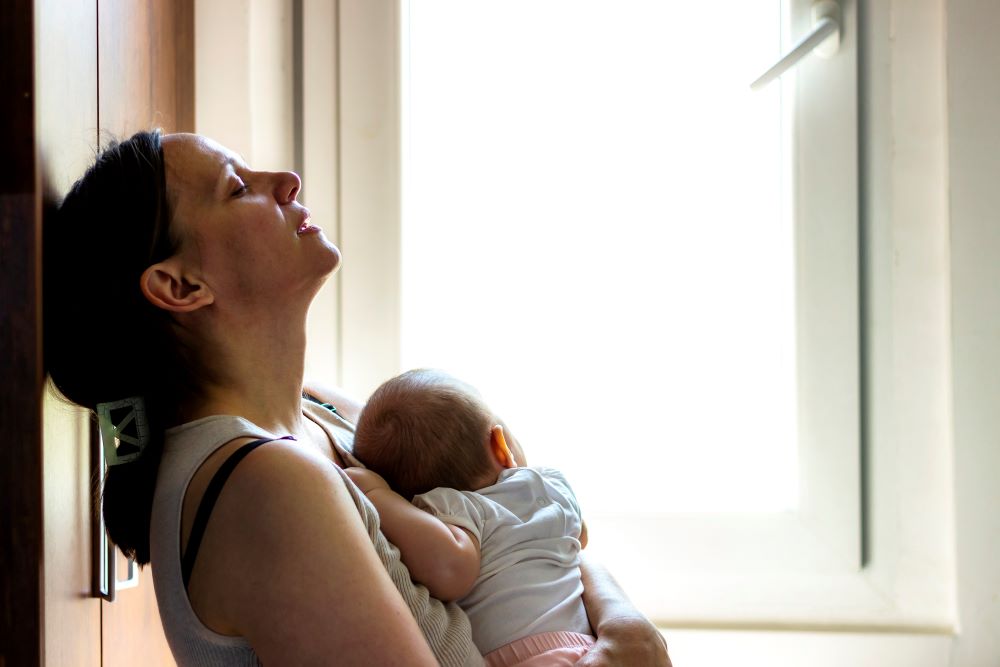Bringing a baby into the world can be as overwhelming as it is joyful. For many new mothers, feelings of exhaustion and anxiety linger much longer than expected, sometimes developing into postpartum depression (PPD). As a Christian counselor, I’ve walked with countless women through this difficult season, providing support rooted in faith and practical advice. Here’s a guide to understanding postpartum depression, and more importantly, how faith can offer hope during this challenging time.
What Is Postpartum Depression?
Postpartum depression isn’t just the baby blues, which usually fade within a couple of weeks after birth. PPD is a more serious condition that can last for months or longer, according to research from the national institutes of health, affecting a mother’s ability to bond with her baby and manage daily tasks. Some symptoms include:
- Deep sadness or mood swings
- Difficulty bonding with your baby
- Trouble sleeping, even when the baby is asleep
- Overwhelming fatigue or loss of energy
- Feelings of hopelessness or worthlessness
If you or someone you know is experiencing these symptoms, seeking support is essential. PPD is a real condition, but the good news is, it’s treatable. Henry Ford Health has a great article on the baby blues v PPD.
Leaning on Faith in the Darkest Times
Faith offers a unique form of support during postpartum depression. It’s easy to feel lost, but Scripture can be a guiding light. One verse I often share with clients is Isaiah 41:10: “So do not fear, for I am with you; do not be dismayed, for I am your God. I will strengthen you and help you.” These words can be a reminder that, even when life feels chaotic, God is present and willing to offer strength.
In times of struggle, leaning on faith through prayer, Scripture, and community can provide solace. You don’t have to have all the answers right away. You just need to know that you’re not walking this path alone.
Building a Strong Support System
Support isn’t only spiritual—it’s also found in people. Often, new mothers hesitate to ask for help. Maybe you don’t want to seem weak, or perhaps you feel that you should be able to handle it all. The truth? None of us are designed to do this on our own. Whether it’s a trusted friend, family member, or church group, building a support network is vital.
Professional Help
Counseling can be a game-changer. Faith-based counseling, in particular, can provide emotional, mental, and spiritual support. When clients come to me, they know they can be vulnerable. My role isn’t to “fix” them but to help them realize that healing is possible. Over the years, I’ve learned that offering a safe, accepting space is often the first step toward transformation.
Practical Steps for Healing
While faith and counseling are essential, there are also practical steps that can help you manage postpartum depression. These are strategies that anyone can adopt, and they can make a huge difference.
1. Practice Self-Compassion
Motherhood brings its fair share of guilt. Maybe you don’t feel as “connected” to your baby as you thought you would, or maybe you’re feeling distant from your partner. Let go of the guilt. The truth is, being a mother is messy, unpredictable, and often exhausting. Giving yourself grace—just as God gives us grace—can be a powerful step toward healing.
2. Get Rest, Even If It Feels Impossible
We’ve all heard it: “Sleep when the baby sleeps.” Easier said than done, right? While it might not always be practical, try to prioritize rest whenever possible. Ask a loved one to step in for a couple of hours so you can take a break, or let go of the pressure to get everything done. The dishes can wait; your mental health can’t.
3. Move, Even If It’s Just a Little
When you’re feeling down, moving your body might be the last thing on your mind. But even a short walk around the block can work wonders. Fresh air and movement can lift your mood, and something as simple as stepping outside can reset your mind.
4. Journal Your Thoughts
Writing down your thoughts, prayers, and feelings can help you process what you’re going through. It doesn’t have to be profound—just honest. Some women find it helpful to write letters to God, expressing their fears, doubts, and hopes. Others might want to focus on the small blessings each day brings, no matter how small.
5. Celebrate Small Victories
Sometimes just getting out of bed can feel like an accomplishment. And you know what? It is an accomplishment. Whether you managed to take a shower, enjoy a hot cup of coffee, or simply survive the day, celebrate that. Recovery is about small, steady steps forward, not giant leaps.
Breaking the Stigma Around Postpartum Depression
Unfortunately, many women feel a sense of shame around postpartum depression. They may think, “I’m supposed to be happy—why do I feel so sad?” If there’s one message I want to leave you with, it’s this: postpartum depression is not a failure of faith, motherhood, or womanhood. It’s a real, medical condition that many women experience. And there is no shame in seeking help.
Reaching out for support—whether it’s a counselor, a pastor, or a friend—is a sign of strength, not weakness. You are not alone in this. God walks beside you, and people are ready to support you if you let them in. The Cleveland Clinic points out the need for support to overcome PPD and encourages you to reach out for help.
Conclusion
Postpartum depression is tough. It challenges you emotionally, mentally, and spiritually. But it’s not the end of the story. Through a combination of faith, support, and practical self-care, you can find healing and peace. Lean into your community, allow yourself grace, and know that there is light at the end of this tunnel. With each day, no matter how slow the progress, you are moving forward. God has not abandoned you, and you don’t have to face this battle alone.
In the hardest moments, remember the promise in Romans 15:13: “May the God of hope fill you with all joy and peace as you trust in him, so that you may overflow with hope by the power of the Holy Spirit.” Keep trusting, keep hoping, and keep moving forward—one step at a time.
Common questions asked about Postpartum Depression:
1. What are the common signs of postpartum depression?
Postpartum depression can manifest as persistent sadness, difficulty bonding with your baby, fatigue, anxiety, and even thoughts of self-harm. If you experience these symptoms for more than two weeks, it’s important to seek professional support.
2. How can faith help in overcoming postpartum depression?
Faith provides comfort through prayer, Scripture, and a supportive church community. These spiritual practices, combined with professional counseling, can foster hope and healing during difficult times.
3. When should I seek help for postpartum depression?
It’s important to reach out for help if your symptoms last more than two weeks or if they interfere with daily life. Professional counseling and support from family, friends, and faith communities can make a significant difference.
Sources & Additional Links:
- Mayo Clinic – Postpartum Depression: https://www.mayoclinic.org/diseases-conditions/postpartum-depression/symptoms-causes/syc-20376617
- Focus on the Family – Christian Counseling for Postpartum Depression: https://www.focusonthefamily.com/get-help/postpartum-depression/
- Crosswalk – Postpartum Depression and the Bible: https://www.crosswalk.com/family/parenting/postpartum-depression-and-the-bible.html

